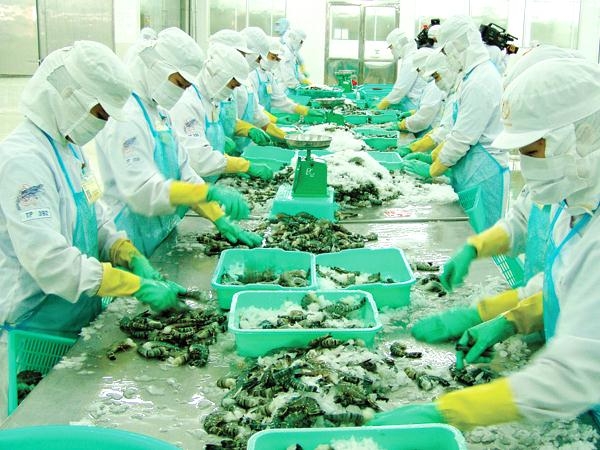Restoring order in shrimp material export: An urgent need

General secretary of the Vietnam Association of Seafood Exporters and Producers (VASEP) Truong Dinh Hoe sheds some light on the issue.
Are there new developments in the export of pre-processed shrimp to China against previous years?
China has been very active in this market for several years. Companies in southern Ca Mau and Bac Lieu provinces started exporting pre-processed material to China, but a manageable amount.
However, China’s purchases have risen considerably over the past two months and the diversity of products has been unusual. They bought black tiger, white claw, and small shrimps. They showed up at various aquaculture areas, bought the shrimp, froze it, and shipped it back in trucks.
Also, they were quick to accept higher prices than Vietnamese firms pay. They bought up volumes amounting to several trucks a day, with each truck averaging 10-15 tonnes of product. This was a major blow to local firms who could only source a fraction, 20 per cent, of their input material needs.
What effects might these extraordinary Chinese purchases have on the local market?
Local processors can hardly compete with the Chinese when it comes to buying input products. Another problem is that Chinese traders pay no heed to health risks such as antibiotic residues or impurities, and this may make producers lackadaisical in ensuring quality standards.
If the Chinese continue to buy up such large consignments, Vietnam’s shrimp exports will see a drastic downturn; and in the first eight months, it reported $1.7 billion. But despite being on track so far, exporters may find it difficult to fulfill the rest of the foreign contracts.
What’s the solution?
A circular released by the Ministry of Industry and Trade in June regulating the import and export of goods by foreign entities denies international traders direct access to local producers. To dodge the law, foreign traders bought materials from local traders. These products may be moving across the border, but are not passing through legal channels.
This is a loss to the state budget, and may severely impact the market.
We must act swiftly to limit the sale of pre-processed shrimp to the Chinese, or any other nation, to avoid the local industry’s investments into processing equipment and technologies going to waste. One measure that has been proposed is to enact a 10 per cent export duty on shrimp to discourage buyers. Whatever the solution, the issue needs to be tackled before the local processed-shrimp export industry takes a major dip.
What the stars mean:
★ Poor ★ ★ Promising ★★★ Good ★★★★ Very good ★★★★★ Exceptional
Latest News
More News
- State corporations poised to drive 2026 growth (February 03, 2026 | 13:58)
- Why high-tech talent will define Vietnam’s growth (February 02, 2026 | 10:47)
- FMCG resilience amid varying storms (February 02, 2026 | 10:00)
- Customs reforms strengthen business confidence, support trade growth (February 01, 2026 | 08:20)
- Vietnam and US to launch sixth trade negotiation round (January 30, 2026 | 15:19)
- Digital publishing emerges as key growth driver in Vietnam (January 30, 2026 | 10:59)
- EVN signs key contract for Tri An hydropower expansion (January 30, 2026 | 10:57)
- Vietnam to lead trade growth in ASEAN (January 29, 2026 | 15:08)
- Carlsberg Vietnam delivers Lunar New Year support in central region (January 28, 2026 | 17:19)
- TikTok penalised $35,000 in Vietnam for consumer protection violations (January 28, 2026 | 17:15)
















 Mobile Version
Mobile Version